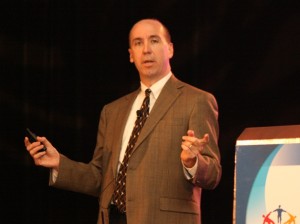An Interview with Futurist Jack Uldrich
I was recently interviewed by Andrew Hall on my responsibilities as a futurist. As I’ve done with past interviews (such as this one on the business of unlearning), I’d thought I’d also share my responses on this website.
How or why did you become a futurist?
By accident. In 2003, I wrote a book on nanotechnology (The Next Big Thing is Really Small: How Nanotechnology Will Change the Future of Your Business). As I came to better understand how nanotechnology was going to transform everything from agriculture, computers, education, energy, and health care to manufacturing, pharmaceuticals and transportation, I was called upon by business leaders and organizations to serve as a “futurist” for their companies and industries.
Who or what has been your greatest influence?
Like many futurists, I began my journey by reading Alvin Toffler’s “Future Shock.” More recently, I’d credit Ray Kurzweil and his thinking about “exponential technologies” as having the greatest impact on my thinking. Can you recommend some resources that beginning futurists might find useful? On a daily basis, I subscribe to MIT’s Technology Review, KurzweilAI, PhysOrg and SpringWise. All offer excellent overviews of emerging and future-related technologies. On a monthly basis, Wired, Fast Company and the Economist (especially it’s quarterly Technology Review section) are outstanding resources. Beyond that, I’d consider joining various “futurist-related” social networks on LinkedIn, Facebook, Google+, Twitter, etc. I’d also recommend becoming an avid reader of good old fashion books/e-books. Gary Hamel’s book “What Matters Now ” and Peter Diamandis’ new book “Abundance” are now on my “to read” list. To avoid the pitfalls of many futurists, I’d also suggest reading Nassim Taleb’s book, “The Black Swan: The Impact of Highly Improbable Events” and Dan Gartner’s book, “Future Babble: Why Expert Predictions Are Next to Worthless and You Can Do Better.”
What do you read for entertainment purposes?
Science fiction. However, so much of today’s science fact reads like science fiction that I spend most of my time reading non-fiction.
What areas or industries are you most well informed?
Health care, energy, retail and education.
Some analysts believe that we are not in a recession and a recovery will not happen, but rather we are undergoing a new evolution in our economy. What’s your take on this?
We are undergoing more than an evolution—it’s more akin to a revolution. The biggest change is that the rate of change is changing–it’s getting faster! No industry is immune to the changes that information technology; robotics, biotechnology, nanotechnology and artificial intelligence are creating. Unless you’re prepared to constantly learn, unlearn and relearn things, you’re going find yourself unemployed a great deal of your life.
In your book Higher Unlearning: 39 Post Requisite Lessons for Achieving a Successful Future, you state that the knowledge we’ve acquired on earth is only 50% of what we’ll learn in the next 7 years, and 25% of what we’ll know in 14. The prospect of this insight is very exciting to me. What do you think the major areas of growth will be? And why?
People tend to think that the field health care is quite advanced and sophisticated today. It isn’t. In ten years we will look back on many of today’s practices – implantable medical devices, surgery, chemotherapy, etc. — as barbaric.
What obstacles do you foresee, that could prevent us (humans) from reaching this potential?
As Mark Twain once said, “It ain’t what you don’t know that get you in trouble, it’s what you know that just ain’t so.” I’m convinced that the greatest barrier to change today is people’s unwillingness to unlearn many of the things they think they know. Without an openness to unlearning, people don’t even think they might need to change in the face of accelerating change.
I also believe that companies and organizations which today benefit and profit from the status quo (e.g. energy producers, university professors, surgeons, etc.) will use their political power in a blatant attempt to thwart many of tomorrow’s most promising technologies. (They’ll be somewhat successful in the short run, however, they’ll lose in the long run.)
Of these emerging trends, what do you project will be the most beneficial to us?
From a health perspective, the revolution in genomics will help deliver more customized, preventative medicine in the near future. From an educational perspective, I’m most excited by free and open universities such as MITx.
What are some current trends, that affect our everyday lives that you consider to be dying or on their way out, or which we will no longer see within the next 5 to 10 years?
How we produce and transmit energy will undergo fundamental transformations over the next two decades. Cheap, clean, and sustainable energy will be the norm by 2030 (hopefully sooner) and today’s emphasis on nuclear, “clean” coal, oil and natural gas will be obsolete.
In my brief studies of this topic, I’ve found that most futurists (if not all) are optimistic about the future. Do you have any serious concerns that threaten the future? If so, how can we avoid them?
Yes. As promising as the field of synthetic biology is, in the hands of one evil or deranged individual, it could wreak a devastating amount of damage on society. I’m also concerned with cyber-terrorism. So many critical and life-enhancing services are dependent on a secure communications network. If it is hacked–which is quite possible–the consequences could be catastrophic. The only way to prevent such tings is to be open to the possibility that they could happen and then expend the necessary resources to track and monitor such possibilities.
In general, however, I share the optimism of most futurists. Universal education, affordable and preventative healthcare, and clean energy will all be feasible in the future.







